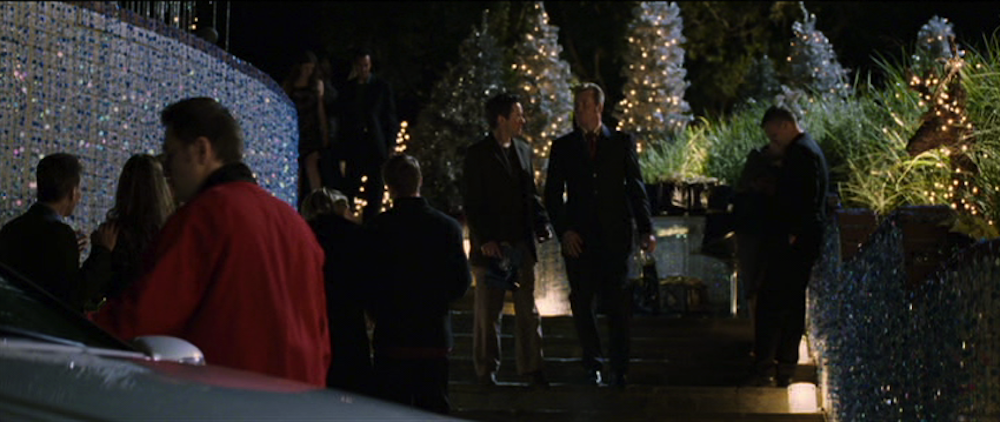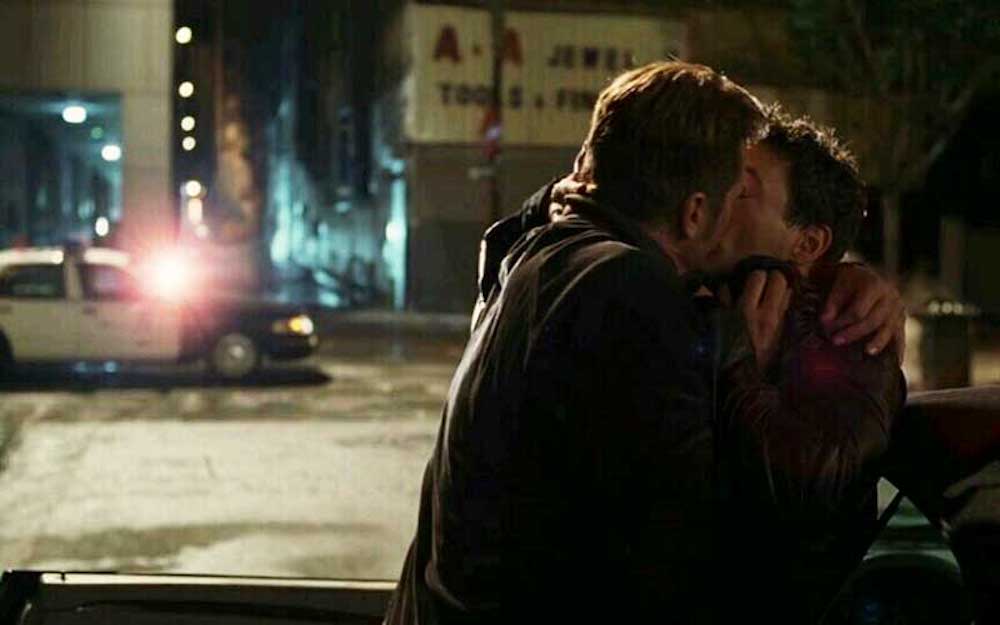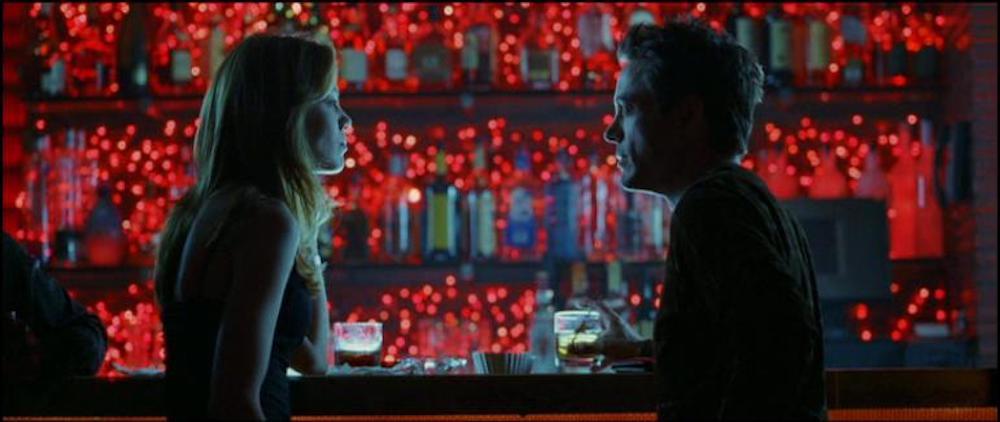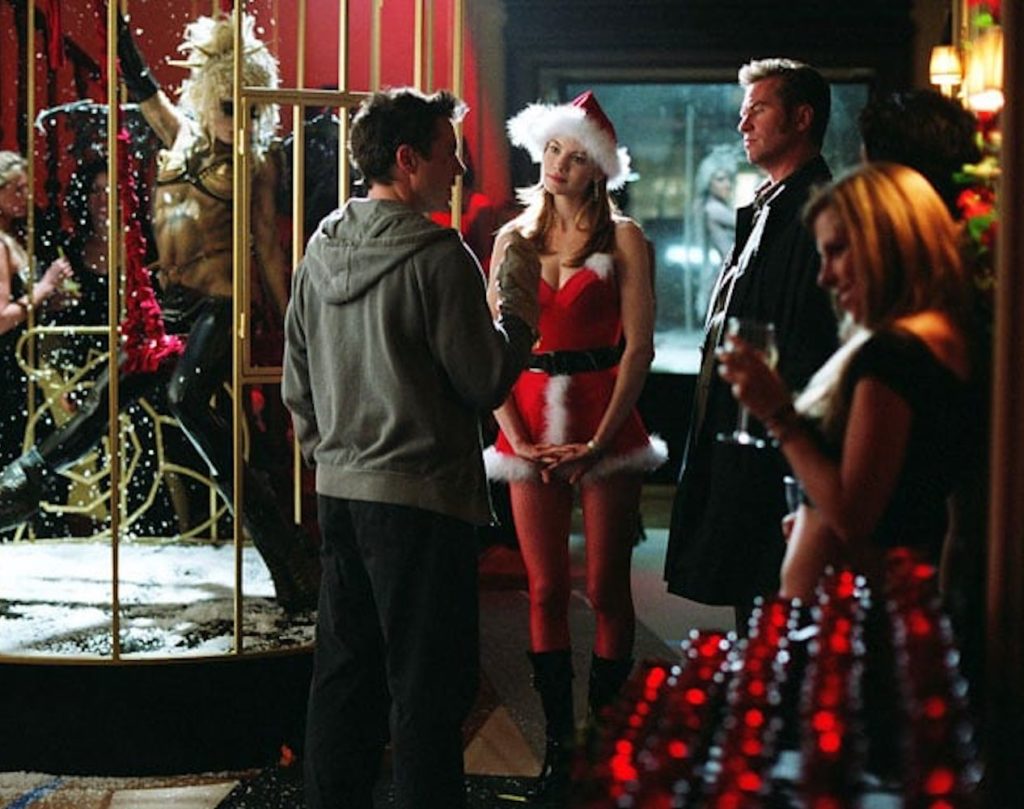| Courtney Kowalke |

Image sourced from A Doctor, A Lawyer, and A Priest
Kiss Kiss Bang Bang plays at the Trylon Cinema from Monday, December 25 through Tuesday, December 26. Visit trylon.org for tickets and more information.
Kiss Kiss Bang Bang (2005) is my Die Hard. It is a Christmas movie, and I defend it as such with my life. Every year since I first saw it in 2007, I trot it out in December alongside the standard fare like A Charlie Brown Christmas and Love Actually. One could argue the holiday is only there for set dressing, but director Shane Black—who so far has set five of the ten films he has written around Christmas—says it’s an intentional choice. In a 2013 interview with Den of Geek, Black noted:
Christmas is fun. It’s unifying, and all your characters are involved in this event that stays within the larger story. It roots it, I think, it grounds everything. At Christmas, lonely people are lonelier, seeing friends and families go by. People take reckoning, they stock of where their lives are at Christmas. It just provides a backdrop against which different things can play out, but with one unifying, global heading. I’ve always liked it, especially in thrillers, for some reason. It’s a touch of magic.1
In true film noir fashion, setting Kiss around Christmas allows for a lot of plot points that gradually dovetail into one unified picture. The plot is set in motion by petty thief Harry Lockhart (Robert Downey Jr.) getting caught robbing a toy store in search of the perfect gift for his niece. While running from the cops, Harry stumbles into an acting audition and so impresses the casting agents present with his “raw emotion” that they fly him out to Los Angeles for further screen tests. While at a Christmas party thrown by Harlan Dexter (Corbin Bernsen), Harry meets “Gay” Perry van Shrike (Val Kilmer, of homoerotic Top Gun fame), a private detective Harry is supposed to train with for his role. Harry also reunites with Harmony Lane (Michelle Monaghan), his high school crush-turned-aspiring actress, at the party. Perry mentions in passing that Harmony does work for him sometimes, too. Like a lot of dialogue in Kiss, that’s a setup that pays off later.
Christmas also kicks off something sinister. The day after the party, Dexter’s daughter fails to pick up her boyfriend, who has flown into L.A. for the holidays. She turns up dead a few hours later, as does Harmony’s younger sister, who had arrived in L.A. without Harmony’s knowledge. From there, the plot moves fast and furious.
2005 was a big year for queer rep in mainstream movies. Western drama Brokeback Mountain dominated the cultural conversation. A lot of that ‘conversation’ was “haha, gay cowboys,” which did not prepare me for how emotionally devastated I was by the end of the film. I never saw Transamerica, but I remember that being well-received as well, with Felicity Huffman being nominated and winning several awards for her role as a trans woman. I am at heart a theater kid, so my friends and I fixated on the film adaptation of Jonathan Larson’s Rent. In hindsight, it doesn’t hold a candle to the stage version, but it was a hell of a lot more accessible in rural Iowa. I also wildly misremembered the reach of personal favorites Kinky Boots and Breakfast on Pluto. The musical adaptation of Kinky Boots won six Tony awards in 2013, and Breakfast on Pluto won four Irish Film and Television Awards. In 2005, however, the most both films scored in America were Best Actor in a Motion Picture – Comedy or Musical nominations for Chiwetel Ejiofor (in 2006, for some reason) and Cillian Murphy.

Most of what I remember of queer rep in 2005 are the gay male minor characters. They often felt like tokens to show the filmmakers were diverse and cool with gay people but not to the extent of making them the focal point. Thad Stone of The Family Stone is an arcade’s worth of tokens, being gay, deaf, and in a relationship with a Black man. Thinking about the dinner scene where the main character puts her foot in her mouth and insinuates she doesn’t think homosexuality is natural makes me cringe to this day.
If filmmakers wanted their protagonists to look more progressive, the gay male minor characters would often be friends with the main character, there to support the main character without needing much development of their own. The main gay male minor character on my radar back then was Damien from 2004’s Mean Girls. Damien does not have a last name. I looked and did not find one for him. He’s also one of the few characters to end the movie without being paired with anyone romantically—even Damien’s best friend, Janis, has Kevin Gnapoor sliding in to ask her out before the epilogue.
While it was nice to have Damien for early 2000s teens to relate to, Gay Perry was aspirational. Perry is effortlessly cool. Perry has a witty retort for everything. Perry doesn’t let much bother him, and he puts anyone who does bother him (especially Harry) in their place, occasionally with a headlock.
I initially put Perry in my “gay male minor character” category because he receives the least development of the three main characters. On paper, Perry’s role is to support Harry and help him adapt to the murder mystery they find themselves embroiled in. However, a re-watch reminded me that the third-to-last scene features Harry and Perry talking about Perry’s personal life and that Perry is the only main character in the second-to-last scene, where he lays into Harmony’s abusive father. After years of watching Kiss, I was shocked to find an earlier draft of its script online that has Harry delivering the same lines in this second-to-last scene.2 I might be biased, but it’s a confrontation that works leaps and bounds better with Perry as the interrogator. By his own admission in the film, Perry isn’t a kind person. The scene needs Perry’s steely attitude to work.
Before I re-watched Kiss in preparation for this piece, I braced myself. I find I commonly run into things I only realize in hindsight are offensive, jokes that have aged poorly or that mock communities I wasn’t fully aware of when I was younger. I was pleasantly less offended than expected. There is, of course, homophobia directed at Perry in the film. For the most part, though, the characters flinging slurs in his direction are the bad guys who—spoiler alert—get got by Perry before the film is over. It’s a little simplistic—the good guys are the ones who are cool with his homosexuality, their enemies are the homophobes. In 2005, though, gay marriage was only legal in Massachusetts, and civil unions were only legal in four other states. It was pretty badass for Kiss to unapologetically equate being queer with being good and being cool in the era it was made in.

Image sourced from The Right Eye
Kiss also subverts expectations with how it handles its heterosexual couple. My favorite romance trope is when people who have been friends for a long time decide to date and/or get married. I’m a sucker for this plot, but the burgeoning romance between Harry and Harmony doesn’t entirely work for me here—and honestly, I’m not sure it’s supposed to.
American essayist Adrienne Rich coined the phrase “compulsory heterosexuality” in her 1980 essay “Compulsory Heterosexuality and Lesbian Existence (1980).”3 While originally used to discuss how women specifically are assumed to be heterosexual early on and are enforced to be heterosexual by a patriarchal society, the term “compulsory heterosexuality”—or “comphet”—has broadened over the past 43 years to include how society assumes or encourages men to be heterosexual, too. Upon further re-watch, Harry’s crush on Harmony strikes me as a comphet crush. Harry loves Harmony. She was his best friend growing up. They were and are very close emotionally, but they’re not physically intimate. Even as adults, their relationship stays unconsummated during the movie. There’s a scene where they both strip down and get into bed together, but they get into a verbal fight before anything sexual happens.
The more I watch Kiss, the more I realize Harry likes telling himself he loves Harmony more than he actually seems to like being with her. He likes the crush more than the relationship. It strikes me as a very comphet thing—you don’t really want to do anything with the object of your affection except have them. You still get to argue that you’re straight! You totally like this person of the opposite gender! You’re not gay; you just like somebody who is unavailable or unattainable. Secretly, maybe part of you is relieved that they’re unattainable.
This reading is reinforced by the ending of Kiss. Harmony is integral to climax, and she appears at the start of the denouement, once all the action has died down. The movie moves on without hinting that she and Harry will start a relationship, though. Harmony’s last scene features her getting resolution for her sister’s death, and Harry mentions that he and Perry traveled with Harmony to her sister’s funeral in the second-to-last scene, but that’s it. The script draft I mentioned earlier has Harry confronting Harmony’s father, then heading outside where Harmony is waiting for him. The two banter about their future together while walking past their old high school as the credits roll.2 None of that is in the finished product. Instead, Kiss ends with a scene showing Harry and Perry working together one year later. (Perry also addresses the audience and apologizes to “all the good people in the Midwest” for saying “fuck” so much, which still kills me.)

Image sourced from Ace Show Biz
In the final scene, Harry tells the audience that if he had to summarize Kiss, he would say, “This movie is about friendship. Friendship is sacred.” Upon further reflection, most if not all, of the other queer movies of 2005 I listed above are about finding community. Families of choice are important to queer people, who might not be offered unconditional love and support by their nuclear families.
A lot of Christmas movies are about finding community, too. Holidays are about spending time with loved ones (or so the movies tell me), and as Black pointed out earlier, they can make lonely people feel lonelier. In Kiss, all three of the main characters have abusive fathers. Harry and Harmony have siblings they care about but aren’t physically close to anymore. Over the course of the movie, Harry, Perry, and Harmony go to hell and back with each other. Despite being fairly open (perhaps for a sequel me and dozens of people have been praying for), the ending indicates that the three of them remain friends after the credits roll. Regardless of who does or doesn’t wind up together romantically, it’s nice to think this weird little trio found each other and have each other for any future holidays and/or murder mysteries.
Bibliography
1 Lambie, Ryan. “Shane Black interview: Iron Man 3, Last Action Hero, writing.” Den of Geek, April 18, 2013. https://www.denofgeek.com/movies/shane-black-interview-iron-man-3-screenwriting-christmas/
2 Black, Shane, director. “Kiss Kiss Bang Bang” (You’ll Never Die In This Town Again). Silver Pictures, 2005. 1 hr., 43 min. https://www.dailyscript.com/scripts/Kiss_Kiss_Bang_Bang.pdf.
3 Rich, Adrienne Cecile. “Compulsory Heterosexuality and Lesbian Existence (1980).” In Blood, Bread, and Poetry: Selected Prose 1979-1985, p. 23. New York City: W. W. Norton & Company, 1986.
Edited by Olga Tchepikova-Treon
